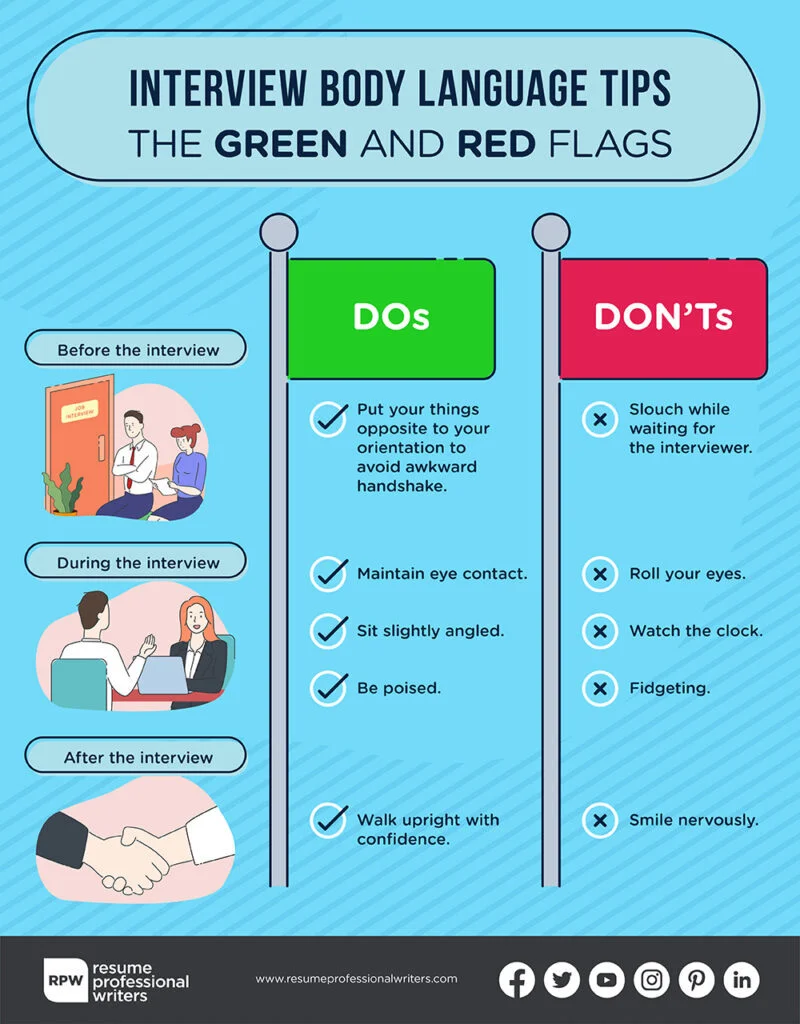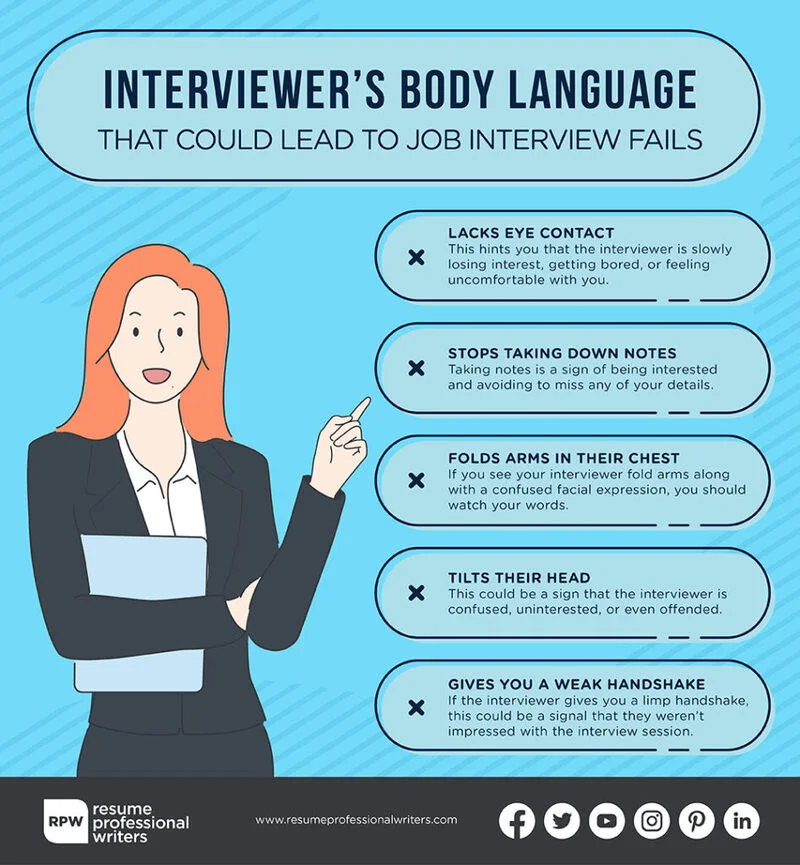Got an interview invite? Start prepping yourself to ace that chance. Your credentials matter, but they aren’t just the factors hiring managers look out for. Your body language can say a lot about you, too. Thus, you have to make sure to impress your interviewer with your confidence. To help you succeed in this stage, we have prepared interview body language tips to show your confidence, preparedness, and sincere interest in taking on the job.
What is Body Language?
Body language is very important, not only in an interview, but also in introducing yourself to all the people you meet. Non-verbal cues are as important as verbal cues because both play key roles in communication. The choice of words, tone, facial expression, and body language are equally important to convey your message effectively.
What is the Importance of Body Language in a Job Interview?
Being a good communicator is your second defense after sending a job-winning resume. Presenting your qualifications and skills during an interview is a plus. As mentioned earlier, body language is an important factor to land your dream job. Many studies say that it’s vital because 70% to 93% of communication is nonverbal. No wonder hiring managers put value in candidate’s body language during the interview. Not only that; it helps you build rapport with the job interviewer, too.
What are the Body Language Tips to Remember for an Interview?
In order to seal your interview on a positive note, make sure to avoid common body language mistakes. A prominent psychologist, Abraham Maslow, once said, “But behavior in the human being is sometimes a defense, a way of concealing motives and thoughts, as language can be a way of hiding your thoughts and preventing communication.” The way you behave in an interview says a lot about you. It could give the hiring manager clues if you’re being honest with your experiences and skills.
What’s in your resume isn’t enough to win the job because you still have to go through a rigorous hiring process. Thus, after you’ve prepared an effective resume, practice and get ready for the interview. Interviewers are equipped to screen applicants—it’s their job, anyway. So, expect that they’ll take note of every detail of your application and consider the way you present yourself during the interview.
Pressured? Fret not; we have listed job interview body language tips to help you conquer your next interview.
Before the Interview
Many people think that their time in the waiting room isn’t important. However, if you want to excel in your interview, think of the opposite. You have to look prepared and composed even when you’re asked to wait in the lobby. You’d never know if the receptionist is keeping an eye on you. So, be ready the moment you enter the building. Make sure to sit up straight and wait patiently for the HR manager.
Key Points:
- Mind your posture.
- Place your things on your left side since you’ll be shaking hands using your right.
- Shake your interviewer’s hands pleasantly.
During the Interview
It’s expected that you’d get nervous. However, you can do something for it not to be obvious. Take deep breaths to calm yourself before you enter the interview room. Be mindful of your actions, but don’t be too conscious because it’ll show and could affect the way you answer the interview questions. Remember, your goal is to impress the interviewer, and displaying confidence is one way to do it. Make sure to sit properly, maintain your poise, make eye contact, and watch out for uncontrolled gestures. Failure to heed these may distract your interviewer, which could lead to job interview fails.
Key Points:
- Mind your gestures.
- Be attentive and responsive.
- Match your interviewer’s positive body language.
- Lean slightly forward and nod your head while listening to express that you’re engaged in the conversation.
After the Interview
After the interview session, don’t put your guard down. It isn’t over until you’re out of the building. However, act natural because hiring managers know if you’re just acting out. End the interview with a smile and a firm handshake. This is your last chance to leave a mark.
Key Points:
- Get your things calmly and stand with poise.
- Mind your walk and maintain composure.
- Let the interviewer lead the way.

Download this Interview Body Language Tips infographic now.
How to Read Someone’s Body Language?
After knowing the common green and red flags of non-verbal interview cues, it’s a plus if you also know how to interpret your interviewer’s body language. Here are some techniques to read body language.
Pay attention to the eyes.
The eyes are the window to the soul. They can say a lot about the person. Hence, take note of the following instances.
- Making eye contact can mean that the person is interested in the conversation. Not doing so indicates they are trying to hide their emotions.
- Looking upward then to the right suggests that the person may be telling a lie.
- Too much blinking signals that the person is uncomfortable.
Observe gestures.
Body movement is a vital part of nonverbal communication. The way you move your head, hands, and feet has a deeper meaning. Check these examples.
- Clenched fists can express frustrations or anger.
- A slightly tilted head suggests that the person is offended, confused, or bored.
- Fidgeting can mean discomfort or nervousness.
Look out for facial expressions.
Facial expressions show the emotions of a person. Thus, observing them is a great help to understand what the person wants to convey.
- Smiling while the eyes narrow suggests that the person is happy.
- A frown can be interpreted as disapproval or sadness.
- A tightened or pursed lip indicates distaste or distrust.
Mind personal space.
Another important factor that you need to consider is the space between the people engaged in a conversation. Proximity indicates how a person views other people.
- Sitting or standing next to each other means good rapport has been established.
- Someone stepping back as you try to move closer suggests that the person isn’t comfortable with you.
- A person moving back while their hand holds the other wrist behind the back could mean they monitor the situation without wanting to interact with other people.
Don’t forgo the context.
To effectively interpret someone’s body language, you have to consider the context of the action. Don’t read the action selectively. For example, when a person keeps on blinking, this doesn’t automatically mean that they’re stressed or uncomfortable. This might also mean that their eyes (or even contact lenses) are dry. Another example is they crossed their arms: This may suggest that they’re proud. But it could also be that they’re cold, and maybe the temperature is too low. Before you judge a particular body language, consider the situation and other factors that could affect it.
How Do You Decode Your Interviewer’s Body Language?
Most people think it’s tough to assess your chances after an interview. Some may lose hope and absorb the body gestures as failed interview signs. Some opt to hope more even if the interviewer’s body language counts as a job interview fail. But did you know that you can use your interviewer’s nonverbal cues to assess your chance of getting the job position?
Yes, interviewers pick up body gestures from you to help them decide whether to count you in or not. However, the body signal works for both sides. As a job applicant, you too, can turn the table and decode your interviewer’s body language. Here are some of the common body gestures you can spot during your interview.

Download this Interviewer’s Body Language infographic now.
Lack Eye Contact
One of the most vital signs of interest is eye contact. It plays a major role as an interviewer’s body language in letting you know that they are interested in counting you in. However, if the evaluator lacks eye contact, you must change your approach fast. They may slowly lose interest, or feel bored or uncomfortable with you. This may lead you to feel scared of losing grip of the job prospect but you need to act fast. Maintain eye contact without making it awkward for both of you. You don’t want an uneasy vibe inside the room, right?
Stop Taking Down Notes
If your interviewer stops jotting down notes and just rests their hands on the table or scrolling through their phone, it’s not a great sign. This could mean the interviewer has already lost interest in what you’re saying.
Fold Arms in Their Chest
An offensive choice of words or impolite act toward a job interviewer can kill your prospect instantly. Unless you can regain yourself back, avoid telling unreliable and unnecessary information and absurd, selfish description. Thus, when you see the interviewer crossing their arms, you have to refocus the conversation and be as polite as possible.
Tilt Their Head
Mostly, tilting the head or shrugging shoulders is a sign that a person is confused, offended, or uninterested. If you spot an interviewer’s body language like this, you can ask politely if you’ve said something that offended them.
Give You a Weak Handshake
Handshake is another indicator that you did well or the opposite. Usually, if the interviewer favors your performance thru the session, they smile and give you a firm handshake.
Body language is something that we all do whether consciously or not. You may not be mindful sometimes but with practice and awareness, you can avoid sending the wrong message. Conveying your message clearly is important, especially when you’re trying to impress someone. Having this skill is a great advantage to get a job.
However, it’ll only make sense if you got an interview invite—and you need a well-written resume for that to happen. If you’re not that confident, let certified resume writers crane up your chances in securing job opportunities and revamp your resume that speaks your skills and talent.









